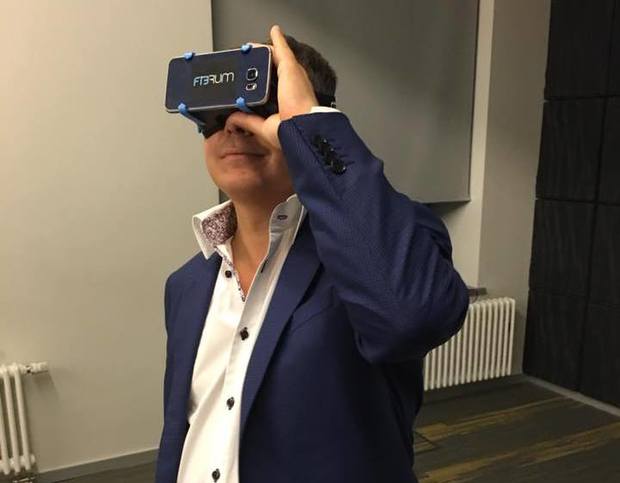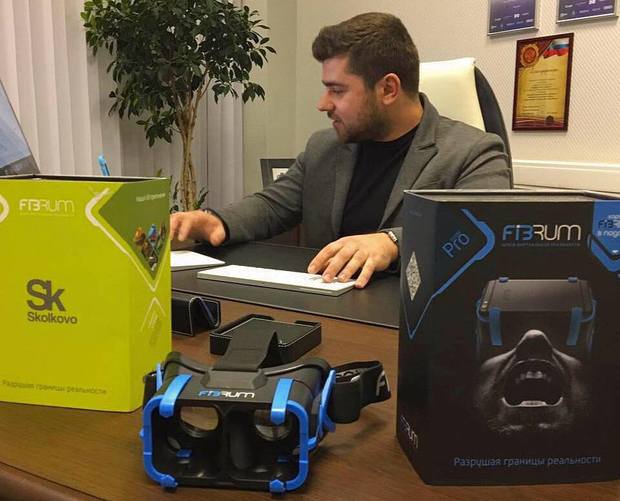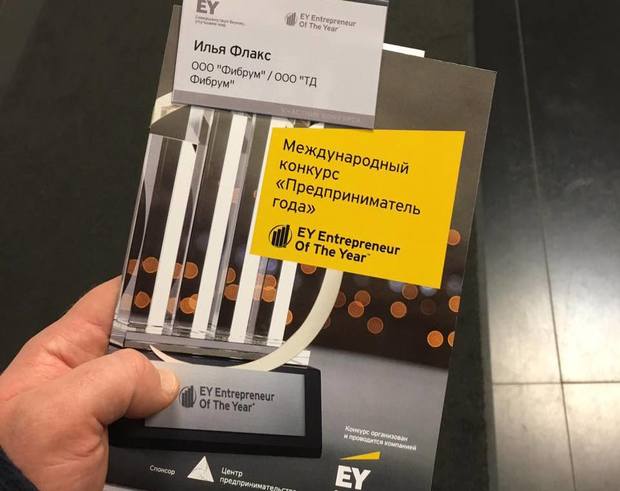Kazan creator of virtual reality headsets admitted to Forbes School of Young Billionaires
Fibrum – a company making mobile VR apps – created by Kazan university graduate Ilya Flaks reached the semi-final of Forbes School of Young Billionaire. We talked to Fibrum's creator and found out why the company manufacturing VR headsets in Chinese factories needed to participate in the contest, whether the republic supports his project and what virtual reality can give humankind except realistic games.
Ticket to comfortable VR
Ilya, why do you need School of Young Billionaire? Are not you a potential billionaire with your virtual headset?
Actually, we joined this project out of competition. Other participants sent their applications beforehand, went through a selection and then were allowed to defend their projects. We won in Go Tech having took first position about 723 companies. As winners, we were awarded participation in School of Billionaire.
Within the framework of the project, Forbes allows the companies to have a mini-blog on the website of the newspaper – it enables to tell the society about their achievements, which is quite important for us. In addition, we are given mentors (at the moment, I can't say who will be with us) – they are billionaires, businesspeople who help have a detached look at the project, advise, help correct some moments.
As far as I am concerned, Forbes has already published the list of mentors, and Andrey Romanenko from Qiwi will work with you.
Well, if it is written, it is not a secret anymore (laughing). Our mentor is Andrey Romanenko, correct. As I understood, Andrey himself chose us. We met a long time ago, he participated with us in a round-table talk of Entrepreneur Of the Year competition. I am very glad that he became our mentor because he has great experience in both Russia and abroad. I think as a mentor he can advise and give Fibrum a lot.
What project do you present for judges?
To start with, I am Fibrum's founder and director general. We make mobile VR apps and created a headset for mobile phones. What is more, it doesn't matter whether it is iPhone, Android or Windows Phone. You just download the app, put the phone into the headset and submerge in virtual reality wherever you are – in a plane,a train, at home on the sofa. We make virtual reality available for everybody, without cables, computers – only with a phone. Now our headset is sold worldwide. We also created 33 apps – games, apps, VR cinemas. At the moment, 18 million users have downloaded our goods (they are absolutely organic users, we spent nothing to increase their number artificially).
A rating of VR companies in the world in different areas has been recently published (VR market landscape – market map). And this year Fibrum has been in three areas at once – game development, platform and hardware. We make a complete product: headset, apps and games and a platform that plays a uniting role – a kind of analogue of Steam.

We make virtual reality available for everybody, without cables, computers – only with a phone
''Even if we don't have experience, we reached industrial sample and produced it''
There are several analogous projects in the world. How are you going to win your clients' heart? In general, is the competition in this sector serious?
Speaking of headsets, there are about 400 different devices in the world that we are actively using because none of these producers makes software. We offer our software, our apps for their headsets. This is why I would not call it a competition. For us, headset is rather marketing. It is not a strategic goal. Software is a strategic goal. Indeed, there are many players concerning headsets. We are their partners, not rivals. As for developers, the market has just appeared.
Where do get spare components for your headset?
We completely designed and created everything in Russia. The first version of the headset was completely made in Russia in several factories – lenses, plastic, boxes, bands for the headset were purchased in different places. When we needed to enter the international stage, we applied the experience that we got in Russia. We moved all headset production of the retail version to China 1,5 years ago, now they are manufactured in several factories in China. However, the headset's design did not change – it is completely made in Russia.
Is it true that the prime cost of the headset is not so high? How much does it cost in a shop?
It is quite expensive in the retail chain. Plus, it has a card to all our apps for one year. I won't tell the price of production. But I will say it is not cheap. Some people say that it is just $2-3, and we earn on it, but it is not true. Production is not cheap.
Former PM of Kazakhstan Karim Masimov was amazed at your headset, President of Tatarstan Rustam Minnikhanov tried it on and also praised it. If I am not mistaken, they promised to support your project 1,5 years ago. Do you really receive support from Kazakhstan and Tatarstan?
To be honest, after the demonstration and presentation of the headset to Karim Masimov, we did not continue our talk and we did not have joint projects. We wrote him during several days, but we did not reach any realisation of the projects probably due to his occupation. But we keep in touch with Tatarstan. For instance, we annually participate in a conference organised by Dmitry Yeremeyev from FIX Group of Companies. Sometimes we discuss some projects with Mayor of Kazan Ilsur Metshin. It is more mentor and organisational help than financial.

The first version of the headset was completely made in Russia in several factories – lenses, plastic, boxes, bands for the headset were purchased in different places. When we needed to enter the international stage, we applied the experience that we got in Russia
''Every person will be able to be in the body of another person and travel being at home through virtual reality''
Ilya, why did virtual reality attract you? What will it give humankind except realistic games?
I have been dealing with the industry since I was 15. At first, there were browser games, then social, mobile ones. At one point (probably it began in childhood when all people watched Matrix), I had an idea to do an experiment. We made our first prototype on a 3D printer, tied a phone to it and watched – it was rather an experiment. At that moment, nobody knew what it would lead to in the future. When we went to the conference and showed just experimental samples, as a result, we completely destroyed the event – people stuck in this virtual reality for the whole day, watched our apps and cases…
What is the future of VR? Actually, it is not the future but the present. It is a ''blue ocean'' that is developing every day. Now we are at the beginning of the road, but we already have a project, for instance, with InterContinental Moscow Tverskaya hotel. Due to it, you will be able to travel in all hotels of this chain worldwide being in the lobby of the hotel. There are several educational cases for kids, schoolchildren and students. We had a special project dedicated to the victory in WWII that recreated events. VR is applied everywhere – history, architecture, tourism, education, medicine. Virtual reality will change our everyday life completely and for the good in 3-5 years. Every person who dreams of being a cook, doctor or president will be able to design these events and be in the body of another person and travel being at home through virtual reality. Virtual reality is endless.
When did developers start to try to make VR headsets? Did you manage to test the first models? How did they look?
Of course, now there are many different models. When we started, even card boards did not exist. It is a card VR headset that probably everybody has now. Card oards appeared two or three months after the conference and Fibrum's ad. Then Google announced cardboards for $5-10, which are available for everyone. One can buy and assemble it on his or her own. Then this area started to actively develop, of course.
In general, we had to learn from our own mistakes during the period of the first prototypes, design focal distance, choose correct glass for lenses. We did it all on our own. We did not have any examples, people to look at and copy.

We already won, in my opinion, in all possible competitions in Russia, so now we deal with a business more than competitions. Our goal is not to prove something to somebody but make a product that would be in demand worldwide
Back to the competition: could you name the worthiest projects that are in the semi-final?
It is difficult to compare the projects of different areas. ATL is quite close to us. It also deals with virtual reality – they make a special gyro sensor that allows to move inside virtual reality. They are cool guys. I was glad to have met them at an investment conference in Finland. They have a big future.
How do you asses your own chances for victory?
I think we have big chances because we already won, in my opinion, in all possible competitions in Russia, so now we deal with the business more than competitions. Our goal is not to prove something to somebody but make a product that would be in demand worldwide. This is why I can't say we are doing our best to win the competition. But we would like to win, of course. And I believe we will.